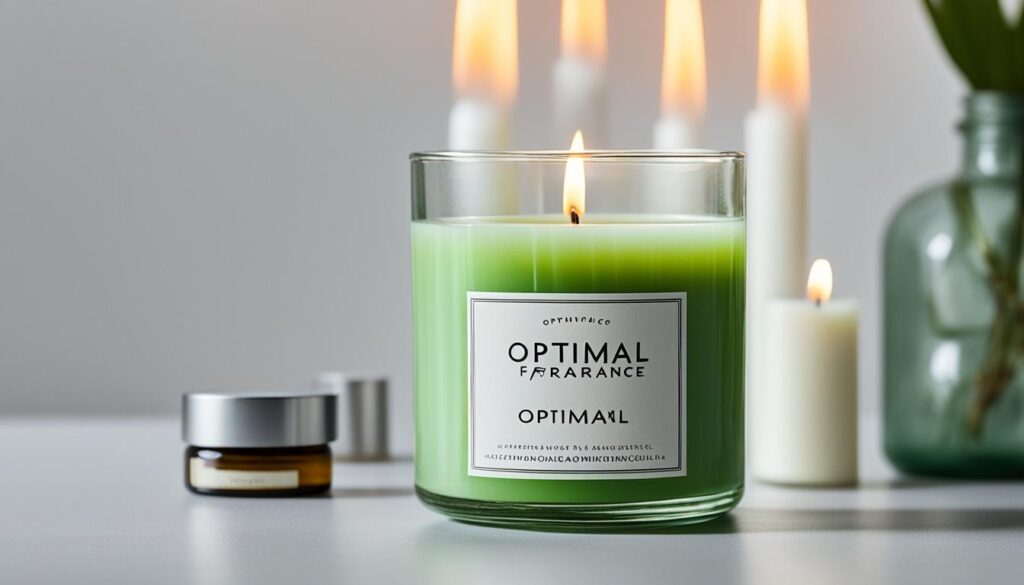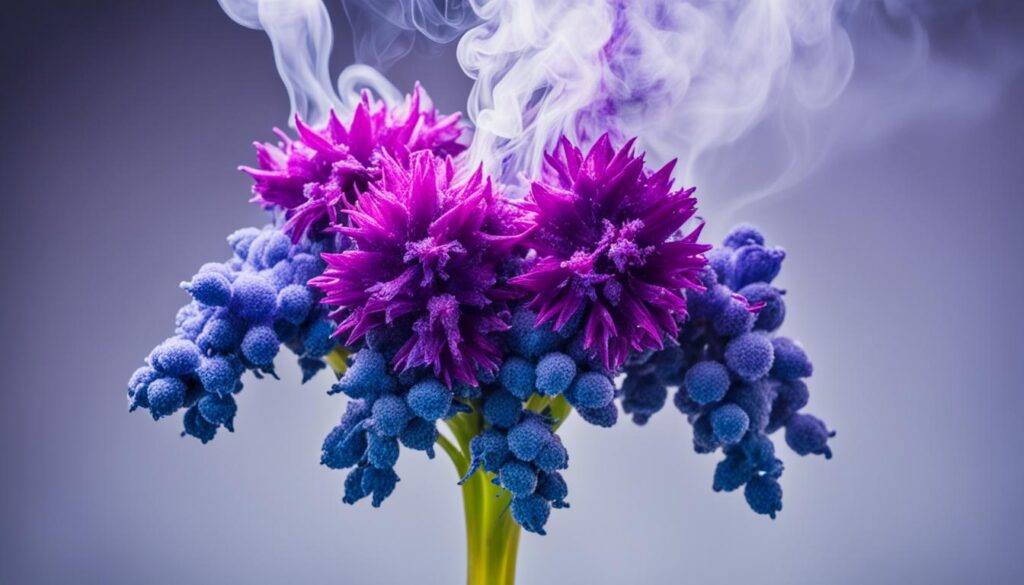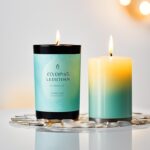How to Make Candles with a Strong Cold and Hot Throw
Are you tired of candles that don’t fill the room with their scent? Learn how to make scented candles with a powerful cold and hot throw. We’ll share the secrets that professional candle makers use. These tips will help you make candles that fill your home with fragrance.
Key Takeaways
- Understand the concepts of cold and hot throw for optimal fragrance performance
- Learn how to properly add fragrance oil at the correct temperature for maximum scent
- Discover the ideal fragrance load to avoid overpowering your space
- Choose the right wick to ensure a consistent, long-lasting burn and scent
- Unlock the secrets to selecting the most suitable fragrance oils for your soy wax candles
Understanding Cold and Hot Throw
Creating candles with a strong scent profile means knowing about cold throw and hot throw. These factors are key to the fragrance of your candle products.
Cold Throw: The Scent Before Lighting
Cold throw is the strength and length of a candle’s fragrance before lighting. It’s the scent that draws people in and sets the mood. A strong cold throw is crucial for grabbing attention and making your candle scent profile stand out.
Hot Throw: The Scent While Burning
Hot throw is the strength of a candle’s fragrance while it’s burning. This is the smell that fills the room, making the experience unforgettable. A great hot throw means your candles will have a lasting, inviting scent that keeps customers coming back.
Getting both cold throw and hot throw right is key to making high-quality, fragrance-rich candles. By understanding these concepts, you can improve your candle-making. This way, you’ll create products that truly delight your customers.
Importance of Strong Cold and Hot Throw
The importance of candle scent is huge for a candle’s success. The cold throw – the scent before lighting – grabs customers’ attention. The hot throw – the scent while burning – keeps them coming back, making them happy with the fragrance.
Getting a good balance in candle fragrance longevity is key for making great scented candles. When cold and hot throw work well together, they make a journey of smells that makes the room feel better and the candle experience better.
| Characteristic | Importance |
|---|---|
| Cold Throw | Draws customers in and piques their interest in the candle’s fragrance |
| Hot Throw | Ensures customer satisfaction and keeps them coming back for the full fragrance experience |
By focusing on a strong cold and hot throw, candle makers make products that really stand out. The right scent can turn a simple candle into a must-have at home. It fills the air with smells that make people happy and make the room feel better.
“A well-crafted candle with a robust cold and hot throw can transport the user to a different time and place, evoking memories and emotions through the power of scent.”
Adding Fragrance Oil at the Correct Temperature
Adding fragrance oil at the right temperature is key for making candles with a strong scent. The best temperature for adding fragrance oil is about 185°F. At this point, the oil mixes well with the wax, making a strong and lasting scent.
Recommended Temperature for Fragrance Oil Addition
Keeping the wax at 185°F when you add fragrance oil is best. This temperature helps the wax and fragrance oil blend together well. This makes the scent in your candles last longer and stay consistent.
Importance of Thorough Stirring
After mixing in the fragrance oil, stir the mixture for at least two minutes. This makes sure the fragrance oil is spread out evenly in the wax. If you don’t mix it well, the scent might not be even, and it won’t smell as good.
“Properly incorporating the fragrance oil at the right temperature and with thorough stirring is a critical step in crafting candles with a strong cold and hot throw.”
Following the right steps for adding fragrance oil and mixing it well brings out the best in your candle’s scent. This makes your candles more appealing to customers right when they open the box.
Finding the Optimal Fragrance Load
When making candles, the right amount of fragrance oil is key. It affects how strong the scent is both when cold and when lit. Finding the perfect balance is important. This balance lets your candles smell amazing.
Maximum Fragrance Load Guidelines
The highest amount of fragrance oil you can use depends on the wax type. For soy wax, 8% is usually the best. Using more can cause problems like uneven burning and safety issues.
Avoiding Overloading with Fragrance Oil
- Too much fragrance oil can make the scent too strong, shorten the burn time, and cause wax and wick problems.
- Stick to the recommended amount to get a strong scent without harming the candle’s quality or safety.
- Finding the optimal fragrance load is all about experimenting and paying attention to details.
| Wax Type | Optimal Fragrance Load | Potential Issues with Overloading |
|---|---|---|
| Soy Wax | ~8% | Poor burn, uneven wax pool, reduced scent throw |
| Paraffin Wax | ~10% | Sooting, accelerated wick drowning, wax cratering |
| Beeswax | ~6% | Brittle, cracking wax, diminished scent release |
Knowing the right amount of fragrance oil to use helps make great candles. It ensures a strong scent without harming your candles. This way, your handcrafted candles will smell wonderful.

Choosing the Right Wick
Choosing the right wick is key to making candles with a strong scent. It’s important to do wick burn tests to find the best one. These tests help you see how the flame size, melt pool width, and soot look. This info helps you pick the perfect wick for your candle.
Conducting Wick Burn Tests
When testing wicks, watch the flame size, melt pool width, and soot. The best wick has a steady flame of 1/2 to 1 inch. It should also have a melt pool that reaches the container’s edges and little to no soot.
Ideal Wick Characteristics
- Steady 1/2 to 1-inch flame
- Melt pool that extends to the container’s edges
- Minimal smoking or soot creation
| Wick Characteristic | Ideal Measurement |
|---|---|
| Flame Size | 1/2 to 1 inch |
| Melt Pool Width | Extends to container edges |
| Soot Production | Minimal |
By picking the right wick and doing detailed wick burn tests, you can make sure your candles have a strong cold and hot throw. This gives your customers a great fragrance experience.
Allowing Sufficient Cure Time
Making a candle with a strong scent is more than just mixing ingredients. The candle curing process is key to bringing out the best in your candle. Soy wax candles need at least 1-2 weeks to fully blend with the fragrance oil.
The longer you let the soy wax candle curing, the stronger the scent will be. This extra time lets the fragrance deeply connect with the wax. This makes the scent last longer and fill the room more intensely.
Being patient is crucial for a great scent. Letting your candles cure for the right amount of time makes them more enjoyable. You’ll create a scent experience that impresses everyone who smells it.
“The secret to creating candles with a strong cold and hot throw lies in the curing process. Be patient, and let your masterpieces reach their full fragrant potential.”
The candle curing process is vital for making candles that really stand out. Take your time to let your candles fully develop their scent. You’ll end up with candles that smell amazing both before and while they’re burning.
Selecting Suitable Fragrance Oils
Choosing the right fragrance oils is key when making candles with a strong scent. Fragrance oils made for soy wax can really boost your candle’s scent. They work well with soy wax, giving a lasting, strong smell that wows people before and while the candle burns.
Fragrance Oils Designed for Soy Wax
It’s important to buy top-notch, soy-safe fragrance oils from trusted sources for the best cold and hot throw. These oils are made to bring out the scent, making your room smell amazing every time you light the candle. By picking the best fragrance oils for soy wax, your candles will impress everyone with their scent.
Looking for the best fragrance oils for strong scent can change your candle-making game. Focus on fragrance oil selection for candles that match well with soy wax. This way, you’ll make candles that truly capture the senses and make a memorable impact.
“The right fragrance oil can make all the difference in elevating your candles to new heights of scent performance.”
strong cold and hot throw candles
By following the steps in this article, you can make candles with a strong scent both cold and hot. Adding fragrance oil at the right temperature and finding the best amount to use are key. Each step is important for making candles that will impress your customers.
Adding the right amount of fragrance oil is crucial for a strong scent. Make sure the wax is at the right temperature before adding the fragrance. Stir the mixture well to spread the fragrance evenly throughout the wax.
Finding the right amount of fragrance to use is also key. Stick to the recommended levels to avoid overloading the wax. This can weaken the scent. Finding the perfect balance is important for a great scent experience.
Choosing the right wick is vital for the hot throw of your candles. Test different wicks and learn what works best with your wax and fragrance. This will help you pick the perfect wick for your candles.
Letting your candles sit for a while before selling them is important. This time lets the fragrance fully develop. It ensures your candles have a strong scent, both when not lit and when they are.
Mastering these techniques for strong scent candles, improving candle fragrance performance, and DIY candles with strong scent will make your candles stand out. You’ll give your customers a better scent experience.

“The right combination of techniques can transform a good candle into an exceptional one, captivating the senses and creating a truly memorable experience.”
Conclusion
Making candles with a strong scent needs careful steps and the right techniques. It’s important to know how scent profiles work. This includes using the right amount of fragrance oils and choosing the best wick.
Also, letting the candles cure for a while is key. By doing this, you can make candles that smell great for a long time and impress your customers.
Using these tips will help you make candles that smell amazing. From the start to when they’re lit, your candles will be a treat for the senses. By understanding summary of strong scent candle making, you can make key takeaways for candle fragrance performance that customers will remember.
As you keep making candles, focus on the details and aim for the best quality. Following these principles will help you make candles that not only delight the senses but also build loyalty among your customers.
FAQ
What is the difference between cold throw and hot throw in candles?
Why is it important to achieve a strong cold and hot throw?
What is the recommended temperature for adding fragrance oil to the wax?
What is the optimal fragrance load for creating a strong scent throw?
What are the characteristics of an ideal wick for a strong hot throw?
How long should candles be cured for a strong cold and hot throw?
What type of fragrance oils should be used for a strong scent throw?
Source Links
- https://www.candlescience.com/learning/candle-making-101-hot-throw/ – Candle Making 101: Hot Throw
- https://nightskycandle.com/blogs/news/cold-throw-hot-throw-soy-candles – Get strong cold and hot throw from your Soy Candles
- https://www.reddit.com/r/candlemaking/comments/k98yao/strong_cold_throw_and_weak_hot_throw/ – Reddit – Dive into anything
- Fragrance That Wows: A Beginner’s Guide to Adding Scents to Your Homemade Candles
- best essential oils for candles
- wood wick guide
- how to make candles smell stronger
- how to ship candles
- how to fix soy wax frosting
- wick Guide how to choose the right wick size with chart
- how to make candle molds
- how to clean candle wax
- how to reuse candle jars
- soy wax candle troubleshooting
- best wax melter for candle making
- how to conduct burn test
- why candle flickering crackling smoking
- how much wax per candle
- how to make candles smell stronger
- Easy Ways to Increase the Scent Throw of Your DIY Candles
- How to Make Candles for Meditation and Relaxation
- Using Upcycled Materials in Candle Making
- How to Make Hand-Poured Candles: Tips and Techniques

Leave a Reply